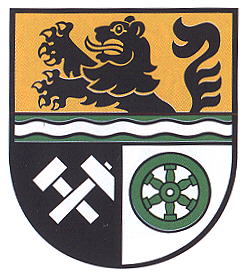Marktgölitz: Difference between revisions
Jump to navigation
Jump to search
Knorrepoes (talk | contribs) m (Text replacement - "/Arms of " to "/Arms (crest) of ") |
Knorrepoes (talk | contribs) m (Text replacement - "{{media}}" to " {{de1}} {{media1}}") |
||
| Line 24: | Line 24: | ||
The black lion in the upper half is taken from the arms of the counts of [[Orlamünde]] and [[Meissen]], who in historical times ruled the area. The wavy bar symbolises the Gölitz river in the municipality. The miner's tools symbolise the mining that used to be of great local importance. The wheel symbolises the position on the main trade routes to Nürnberg. | The black lion in the upper half is taken from the arms of the counts of [[Orlamünde]] and [[Meissen]], who in historical times ruled the area. The wavy bar symbolises the Gölitz river in the municipality. The miner's tools symbolise the mining that used to be of great local importance. The wheel symbolises the position on the main trade routes to Nürnberg. | ||
{{ | |||
{{de1}} | |||
{{media1}} | |||
[[Civic Heraldry Literature - Germany|'''Literature''']]: Ulle, 1997. | [[Civic Heraldry Literature - Germany|'''Literature''']]: Ulle, 1997. | ||
Revision as of 12:20, 26 December 2022
This page is part of the German heraldry portal Deutsche Wappensammlung |
Heraldry of the World |
|
German heraldry:
|
Selected collector's items from Germany:
|
MARKTGÖLITZ
State : Thüringen
District (Kreis) : Saalfeld-Rudolstadt
Incorporated into : 2004 Probstzella
| German | |
| English | No blazon/translation known. Please click here to send your (heraldic !) blazon or translation |
Origin/meaning
The arms were officially granted on October 4, 1995.
The black lion in the upper half is taken from the arms of the counts of Orlamünde and Meissen, who in historical times ruled the area. The wavy bar symbolises the Gölitz river in the municipality. The miner's tools symbolise the mining that used to be of great local importance. The wheel symbolises the position on the main trade routes to Nürnberg.
Literature: Ulle, 1997.


